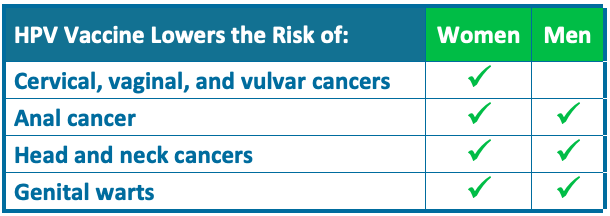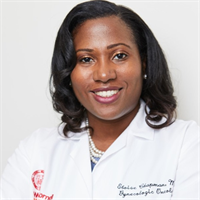Human papillomavirus (HPV) is a sexually transmitted infection (STI) and is currently the most common STI in the United States.1 The virus resolves on its own in 90% of people but in about 10%, the virus remains and puts those individuals at risk for cancers later in life.2 HPV can cause cervical cancer in females and skin warts, genital warts, anal cancer, and oropharyngeal cancer in both females and males.34
The HPV vaccine has been shown to be effective in preventing cervical cancer in females.5 The vaccine can also help reduce the risk of anal cancer, head and neck cancers, and genital warts in males.6 From 2012 to 2016, there were about 44,000 cases of HPV-associated cancers annually.7 About 32,000 of those cases could have been prevented by the 9-valent HPV vaccine. Most of the cancers that were found were cervical and head and neck cancers.
The current recommendation by the Centers for Disease Control and Prevention (CDC) and Advisory Committee on Immunization Practices (ACIP) states that the average age of HPV vaccination should be around 11 to 12 years old, with the potential of starting as early as 9 years old. For those under age 15, two doses of the 9-valent vaccine are recommended.8 The second dose can be given anywhere from 6 to 12 months after the first dose. If the second dose is given earlier than 5 months after the first dose, then a 3-dose series must be started. After the age of 15, three doses of the 9-valent vaccine are recommended. The second dose is given about 1 to 2 months after the first and the third dose is given about 6 months after the first.
If the vaccine schedule is disrupted, patients do not need to repeat doses but can continue where they left off. There is no maximum interval between doses.8
Studies have shown that getting the 2-dose schedule from ages 9 to 14 produces higher antibody titers, or improved protection to the virus, compared to the 3-dose schedule from ages 15 to 26 in both males and females.9,10
As of 2019, the ACIP has stated that all individuals up to the age of 26 may get vaccinated with observable benefits.11 For individuals aged 27 to 45, catch-up vaccination is not recommended. HPV has been known to occur shortly after first sexual activity, with most new infections occurring in younger populations such as young adults. The vaccine is recommended for younger populations, because it is highly effective before any exposure to HPV which is usually before any sexual activity.12 Certain patients age 27 to 45 years old who were not previously vaccinated and who are at risk for a new HPV infection may consider getting vaccinated after shared decision making with their healthcare provider.
References
- Satterwhite CL, Torrone E, Meites E, et al. Sexually transmitted infections among US women and men: prevalence and incidence estimates, 2008. Sex Transm Dis 2013; 40 (3): 187-193.
- Centers for Disease Control and Prevention. Human Papillomavirus (HPV): HPV Infection. 2021; https://www.cdc.gov/hpv/parents/about-hpv.html. Accessed 19 Dec 2021.
- Viens LJ, Henley SJ, Watson M, et al. Human Papillomavirus-Associated Cancers - United States, 2008-2012. MMWR Morb Mortal Wkly Rep 2016; 65 (26): 661-666.
- Egawa N, Doorbar J. The low-risk papillomaviruses. Virus Res 2017; 231: 119-127.
- Powell SE, Hariri S, Steinau M, et al. Impact of human papillomavirus (HPV) vaccination on HPV 16/18-related prevalence in precancerous cervical lesions. Vaccine 2012; 31 (1): 109-113.
- GARDASlL 9 Vaccine [package insert]. Whitehouse Station, NJ: Merck Sharp & Dohme Corp.; 2021.
- Senkomago V, Henley SJ, Thomas CC, et al. Human Papillomavirus-Attributable Cancers - United States, 2012-2016. MMWR Morb Mortal Wkly Rep 2019; 68 (33): 724-728.
- Centers for Disease Control and Prevention. Human Papillomavirus (HPV): HPV Vaccine Schedule and Dosing. 2021; https://www.cdc.gov/hpv/hcp/schedules-recommendations.html. Accessed 19 Dec 2021.
- Recommendations on the use of quadrivalent human papillomavirus vaccine in males--Advisory Committee on Immunization Practices (ACIP), 2011. MMWR Morb Mortal Wkly Rep 2011; 60 (50): 1705-1708.
- Markowitz LE, Dunne EF, Saraiya M, et al. Quadrivalent Human Papillomavirus Vaccine: Recommendations of the Advisory Committee on Immunization Practices (ACIP). MMWR Recomm Rep 2007; 56 (Rr-2): 1-24.
- Meites E, Szilagyi PG, Chesson HW, et al. Human Papillomavirus Vaccination for Adults: Updated Recommendations of the Advisory Committee on Immunization Practices. MMWR Morb Mortal Wkly Rep 2019; 68 (32): 698-702.
- Braaten KP, Laufer MR. Human papillomavirus (HPV), HPV-related disease, and the HPV vaccine. Rev Obstet Gynecol 2008; 1 (1): 2-10.



.png)